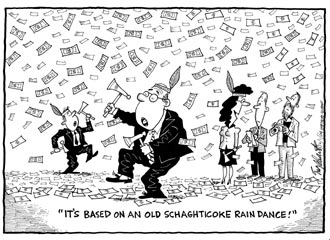 Another Stereotype of the Month entry:
Another Stereotype of the Month entry:
 Another Stereotype of the Month entry:
Another Stereotype of the Month entry:
Long Beach Press Telegram
Neighborhood casinos
Urban areas are next stop for tribes.
Wednesday, August 18, 2004 -- When California voters approved the Indian gaming initiative in 2000, they thought they were bringing an economic renewal opportunity to impoverished, out-of-the-way reservations. How naive that now seems.
The tribes quickly made mountains of money and used it to buy political clout, easily purchased in California. And now some Indian tribes (a designation that has become looser than North Las Vegas slot machines) are using that clout to push casinos into urban areas.
As a result, the fragile dam that has held back Vegas-style gambling in California is springing some serious leaks. It hasn't burst yet, but it's about to.
Gov. Arnold Schwarzenegger is preparing to sign a deal that would allow a mammoth casino reportedly the size of five Costco stores into an urban part of the Bay Area. The Lytton Band of Pomo Indians exploited a loophole in the law to create a "reservation" on 10 acres of urban commercial property. In exchange for Schwarzenegger's approval, the tribe has agreed to give up 25 percent of house profits.
Meanwhile, financially troubled cities and counties throughout the state are teaming with Indian tribes and developers and drawing up similar gambling expansion plans. Dozens of plans for urban casino are in the works statewide, including one near Disneyland in Garden Grove. The L.A. Times reported Wednesday that the city hopes to build an enormous, Las Vegas style mega-resort with casino developer Steve Wynn and the San Diego County-based Mesa Grande Band of Mission Indians.
(Just a thought: How long until someone "discovers" that the Queen Mary is resting on sacred Puvungna fishing grounds that rightfully deserve reservation status?)
Once Schwarzenegger signs the Lytton casino deal, Vegas-style gambling will be here to stay. He'll be creating a permanent revenue source that the state will never want to give up.
Whether all this is a good thing or a bad thing depends on your point of view, because gambling is such a mixed bag. For every benefit of a casino, such as the increases in state and local revenue, job creation and entertainment opportunities there are potential downsides, including corruption, crime and addiction.
If Vegas-style casinos become part of the urban landscape, as it appears they soon will, state government must do everything possible to minimize the problems associated with gambling.
This means establishing a strong state regulatory system (there isn't one now) to ensure that casinos are playing by the rules, keeping organized crime at a far distance, providing enough security to ensure the safety of local communities, and giving the state its rightful cut of the profits. Some revenue should also be set aside to assist nonprofit groups that treat gambling addiction.
California may soon have more casinos, but it can't roll the dice where public safety and aggressive industry regulation are concerned.
Rob's comment
The stereotypes here are the following:
Tribes who seek off-reservation gaming aren't making up reservations. The law says they can petition to take any land in their historic range into trust (and thus make it eligible for gaming). If you don't like the law, blame your Congressional representatives and demand that they change it. Don't blame Indians for seeking land they once inhabited before the government took it from them.
For more on the process of recognizing tribes, see Benedict: Schaghticoke, Eastern Pequot Tribes Are "Bogus".
Also worth noting is the following comment:
This means establishing a strong state regulatory system (there isn't one now) to ensure that casinos are playing by the rules, keeping organized crime at a far distance
Whether California's regulatory system is "strong" or not is a matter of opinion. But this statement ignores the fact that gaming tribes have strong tribal regulatory systems. By law these systems are the first line of defense at Indian casinos. They have ensured that tribes are playing by the rules and keeping organized crime at a "far distance," thus proving their efficacy.
Related links
The facts about Indian gaming
|
. . . |

|
All material © copyright its original owners, except where noted.
Original text and pictures © copyright 2007 by Robert Schmidt.
Copyrighted material is posted under the Fair Use provision of the Copyright Act,
which allows copying for nonprofit educational uses including criticism and commentary.
Comments sent to the publisher become the property of Blue Corn Comics
and may be used in other postings without permission.